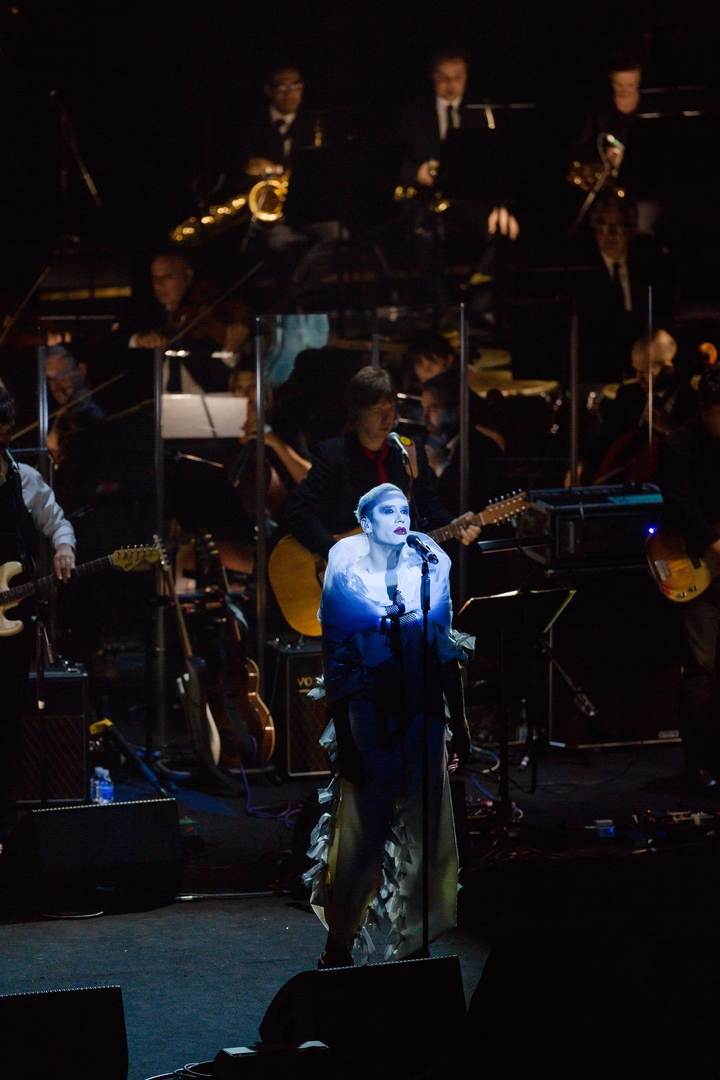
David Bowie: Nothing Has Changed | Riverside Theatre | 10 Nov
The passing of a popular music paragon earlier this year has given rise to no shortage of tributes that attest to David Bowie’s far-reaching, seminal and ubiquitous influence across a range of fields of creative practice.
The Nothing Has Changed orchestral suite and tour, which has moved through various capitals in Australia over the past months—including the Melbourne Festival, the Sydney Opera House and the Brisbane Exhibition Centre (with the Adelaide festival to come in 2017)—is perhaps (or hopefully) the culmination of this local tributary process.
The seemingly endless laurel-bestowing tendency that has unfurled in the wake of Bowie’s passing is starting to feel a little long in the tooth.
The line between tribute and parody can be a treacherously thin one, and nowhere is this more clearly demonstrated than in the Nothing Has Changed franchise, which oscillates between moments of true sublimity and karaoke-level banality.
A rotating cast of well-known Australian singers/entertainers takes on the task of presenting the classic Bowie songbook: iOTA, Deborah Conway, Tim Rogers, Adalita and Steve Kilbey take on primary vocal duties, with admirable back-up support from Robyn Loau and Jade MacRae.
Musical backing is provided by the Western Australian Symphony Orchestra, as well as a band of accomplished session players: Ashley Naylor and David Lane on guitars, Laurence Pike on drums, and Clayton Doley on the keys/piano.
The array of talent on display here is indeed impressive, which makes one wonder all the more why it fails to reach a sum total greater than its parts.
There are, however, some wonderful moments. Many of these are supplied by iOTA, whose committed vocal and performative takes on Bowie staples such as Space Odditty, Suffragette City, Fashion and Life on Mars provide some of the show’s most compelling and incendiary moments.
Deborah Conway’s attempts are somewhat varied in their results: Starman and Ziggy Stardust—rock touchstones notoriously difficult to pull off—take glam whimsy to the point of camp silliness, while Fame (a duet with Tim Rogers) and Oh! You Pretty Things are more successful and suited to Conway’s lounge/cabaret style delivery.
Adalita, used to delivering heavier and more angsty material, struggles to find the right tone for both Rebel Rebel and Jean Genie, while the duet with Tim Rogers on Sorrow hits the right balance between wistfulness and edge.
Steve Kilbey suffers a similar fate, with efforts at Diamond Dogs and Changes passable but ordinary Dad-karaoke fare. Unfortunately the duet with Robyn Loau on China Girl is just embarrassing, and redeemed only by Kilbey’s solid, shaman-like incantation of the epic, cult title track from 1976’s art-rock masterpiece Station to Station.
Tim Rogers deploys his trademark swagger and charm to good effect in All the Young Dudes, Young Americans and the bleak, gut-wrenching swansong Lazarus from Bowie’s final and (only just) posthumous album Blackstar.
The overall issue with the conceptualization of this show is that it appears less as a complete re-imagining of Bowie’s classic compositions within an orchestral context, than a Bowie cover band (a very good one, mind you) with some orchestral bedding as an afterthought.
In many of the more rock/pop oriented tracks the orchestra is barely noticeable nor needed, while the orchestra is enabled to shine only in those tracks which already contained more spacious and ambitious instrumental arrangements in the first place.
The result is probably that which plagues any tribute or cover act, despite the virtuosity of individual performers, the performance as a whole fails to transcend or even approach the singularity of the source material, and therefore leaves one wondering what the purpose is of such a project.
Not to transform or transcend Bowie, but to revel in our nostalgia and affection for the Bowie mythos in a collective context. A worthy project, but hardly one that is likely to lend itself to the generation of truly genuine performance, other than the donning of various masks and adopting of familiar poses which—perhaps—after all, is the point.
Jade Nobbs




